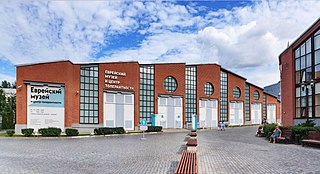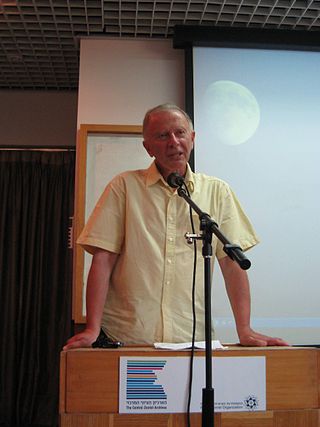Antisemitism or Jew-hatred is hostility to, prejudice towards, or discrimination against, Jews. This sentiment is a form of racism, and a person who harbours it is called an antisemite. Primarily, antisemitic tendencies may be motivated by negative sentiment towards Jews as a people or by negative sentiment towards Jews with regard to Judaism. In the former case, usually presented as racial antisemitism, a person's hostility is driven by the belief that Jews constitute a distinct race with inherent traits or characteristics that are repulsive or inferior to the preferred traits or characteristics within that person's society. In the latter case, known as religious antisemitism, a person's hostility is driven by their religion's perception of Jews and Judaism, typically encompassing doctrines of supersession that expect or demand Jews to turn away from Judaism and submit to the religion presenting itself as Judaism's successor faith—this is a common theme within the other Abrahamic religions. The development of racial and religious antisemitism has historically been encouraged by the concept of anti-Judaism, which is distinct from antisemitism itself.

The history of the Jews in Russia and areas historically connected with it goes back at least 1,500 years. Jews in Russia have historically constituted a large religious and ethnic diaspora; the Russian Empire at one time hosted the largest population of Jews in the world. Within these territories, the primarily Ashkenazi Jewish communities of many different areas flourished and developed many of modern Judaism's most distinctive theological and cultural traditions, while also facing periods of antisemitic discriminatory policies and persecution, including violent pogroms.
The "doctors' plot" was a Soviet state-sponsored antisemitic campaign based on a conspiracy theory that alleged a cabal of prominent medical specialists, predominantly of Jewish ethnicity, intended to murder leading government and communist party officials. It was also known as the case of saboteur doctors or killer doctors. In 1951–1953, a group of mostly Jewish doctors from Moscow were accused of a conspiracy to assassinate Soviet leaders. This was later accompanied by publications of antisemitic character in the media which talked about the threats of Zionism and condemned people with Jewish surnames. Following this, many doctors, both Jews and non-Jews, were dismissed from their jobs, arrested, and tortured to produce admissions. A few weeks after Stalin's death in 1953, the new Soviet leadership said there was a lack of evidence regarding the doctors' plot and the case was dropped. Soon after, the case was declared to have been a fabrication.
The Anti-Zionist Committee of the Soviet Public was a body formed in 1983 in the Soviet Union as an anti-Zionist propaganda tool. Formation of AZCSP was approved on 29 March 1983 by the Secretariat of the Central Committee of the Communist Party of the Soviet Union in resolution 101/62ГС: "Support the proposition of the Department of Propaganda of the Central Committee and the KGB USSR about the creation of the Anti-Zionist Committee of the Soviet Public..."
Soviet anti-Zionism is an anti-Zionist and pro-Arab doctrine promulgated in the Soviet Union during the Cold War. While the Soviet Union initially pursued a pro-Zionist policy after World War II due to its perception that the Jewish state would be socialist and pro-Soviet, its outlook on the Arab–Israeli conflict changed as Israel began to develop a close relationship with the United States and aligned itself with the Western Bloc.
New antisemitism is the concept that a new form of antisemitism developed in the late 20th and early 21st centuries, typically manifesting itself as anti-Zionism. The concept is included in some definitions of antisemitism, such as the working definition of antisemitism and the 3D test of antisemitism. The concept dates to the early 1970s.

DavidBergelson was a Yiddish language writer born in the Russian Empire. He lived for a time in Berlin, Germany, before moving to the Soviet Union following the Nazi rise to power in Germany. He was a victim of the post-war antisemitic "rootless cosmopolitan" campaign and one of those executed on the Night of the Murdered Poets.

Robert Solomon Wistrich was a scholar of antisemitism, considered one of the world's foremost authorities on antisemitism.
The accusation that Joseph Stalin was antisemitic is much discussed by historians. Although part of a movement that included Jews and ostensibly rejected antisemitism, he privately displayed a contemptuous attitude toward Jews on various occasions that were witnessed by his contemporaries, and are documented by historical sources. Stalin argued that the Jews possessed a national character but were not a nation and were thus unassimilable. He argued that Jewish nationalism, particularly Zionism, was hostile to socialism. In 1939, he reversed communist policy and began a cooperation with Nazi Germany that included the removal of high-profile Jews from the Kremlin. As dictator of the Soviet Union, he promoted repressive policies that conspicuously impacted Jews shortly after World War II, especially during the anti-cosmopolitan campaign. At the time of his death, Stalin was planning an even larger campaign against Jews, which included the deportation of all Jews within the Soviet Union to Northern Kazakhstan. According to his successor Nikita Khrushchev, Stalin was fomenting the doctors' plot as a pretext for further anti-Jewish repressions.
Antisemitic tropes, also known as antisemitic canards or antisemitic libels, are "sensational reports, misrepresentations or fabrications" about Jews as an ethnicity or Judaism as a religion.

In Search of Happiness is a 2005 Russian documentary film that poetically follows the lives of Boris and Masha Rak, Soviet Jews who in 1934 moved to the Jewish Autonomous Oblast (JAO) created by the Soviet government in Russian Far East. The film won the Best Documentary award in the Russian Film Festival in 2006.

Anti-Zionism is opposition to Zionism. Although anti-Zionism is a heterogeneous phenomenon, all its proponents agree that the creation of the modern State of Israel, and the movement to create a sovereign Jewish state in the region of Palestine—a region partly coinciding with the biblical Land of Israel—was flawed or unjust in some way.
The anti-Jewish violence in Central and Eastern Europe following the retreat of Nazi German occupational forces and the arrival of the Soviet Red Army – during the latter stages of World War II – was linked in part to postwar anarchy and economic chaos exacerbated by the Stalinist policies imposed across the territories of expanded Soviet republics and new satellite countries. The anti-semitic attacks had become frequent in Soviet towns ravaged by war; at the marketplaces, in depleted stores, in schools, and even at state enterprises. Protest letters were sent to Moscow from numerous Russian, Ukrainian and Belarusian towns by the Jewish Anti-Fascist Committee involved in documenting the Holocaust.
Person of Jewish ethnicity is а Russian circumlocution used as an euphemism for "Jew".
The February Revolution in Russia officially ended a centuries-old regime of antisemitism in the Russian Empire, legally abolishing the Pale of Settlement. However, the previous legacy of antisemitism was continued and furthered by the Soviet state, especially under Joseph Stalin. After 1948, antisemitism reached new heights in the Soviet Union, especially during the anti-cosmopolitan campaign, in which numerous Yiddish-writing poets, writers, painters and sculptors were arrested or killed. This campaign culminated in the so-called Doctors' plot, in which a group of doctors were subjected to a show trial for supposedly having plotted to assassinate Stalin. Although repression eased after Stalin's death, persecution of Jews would continue until the late 1980s.
Antisemitism in contemporary Hungary principally takes the form of negative stereotypes relating to Jews, although historically it manifested itself more violently. Studies show antisemitism has become more prevalent since the fall of Communism, particularly among the younger generations. Surveys performed from 2009 and beyond have consistently found high levels of antisemitic feelings amongst the general population.
Soviet leaders and authorities officially condemned nationalism and proclaimed internationalism, including the right of nations and peoples to self-determination. Soviet internationalism during the era of the USSR and within its borders meant diversity or multiculturalism. This is because the USSR used the term "nation" to refer to ethnic or national communities and or ethnic groups. The Soviet Union claimed to be supportive of self-determination and rights of many minorities and colonized peoples. However, it significantly marginalized people of certain ethnic groups designated as "enemies of the people", pushed their assimilation, and promoted chauvinistic Russian nationalistic and settler-colonialist activities in their lands. Whereas Vladimir Lenin had supported and implemented policies of korenizatsiia, Joseph Stalin reversed much of the previous policies, signing off on orders to deport and exile multiple ethnic-linguistic groups brandished as "traitors to the Fatherland", including the Balkars, Crimean Tatars, Chechens, Ingush, Karachays, Kalmyks, Koreans and Meskhetian Turks, with those, who survived the collective deportation to Siberia or Central Asia, were legally designated "special settlers", meaning that they were officially second-class citizens with few rights and were confined within small perimeters.
The anti-cosmopolitan campaign was an anti-Western campaign in the Soviet Union which began in late 1948 and has been widely described as a thinly disguised antisemitic purge. A large number of Jews were persecuted as Zionists or rootless cosmopolitans.
Anti-antisemitism is opposition to antisemitism or prejudice against Jews, and just like the history of antisemitism, the history of anti-antisemitism is long and multifaceted. According to historian Omer Bartov, political controversies around antisemitism involve "those who see the world through an antisemitic prism, for whom everything that has gone wrong with the world, or with their personal lives, is the fault of the Jews; and those who see the world through an anti-antisemitic prism, for whom every critical observation of Jews as individuals or as a community, or, most crucially, of the state of Israel, is inherently antisemitic". It is disputed whether or not anti-antisemitism is synonymous with philosemitism, but anti-antisemitism often includes the "imaginary and symbolic idealization of ‘the Jew’" which is similar to philosemitism.
Zionist antisemitism or antisemitic Zionism refers to a phenomenon in which antisemites express support for Zionism and the State of Israel. In some cases, this support may be promoted for explicitly antisemitic reasons. Historically, this type of antisemitism has been most notable among Christian Zionists, who may perpetrate religious antisemitism while being outspoken in their support for Jewish sovereignty in Israel due to their interpretation of Christian eschatology. Similarly, people who identify with the political far-right, particularly in Europe and the United States, may support the Zionist movement because they seek to expel Jews from their country and see Zionism as the least complicated method of achieving this goal and satisfying their racial antisemitism.





